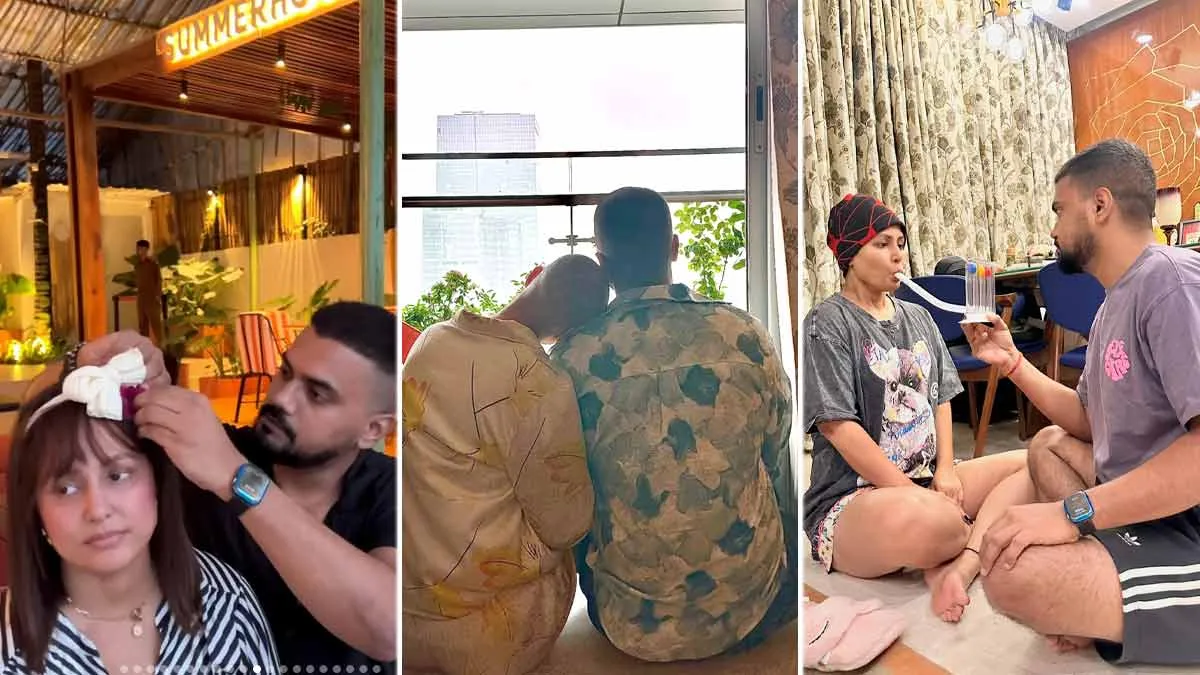
Supporting loved ones in tough times of cancer is a cure that can do wonders for the patients. In the same attempt, Hina Khan shared how her boyfriend, Rocky Jaiswal shaved his head to support her amid breast cancer and stand by her during the treatment. The TV actress has been in the limelight for her battle with stage 3 breast cancer and throughout this challenging period, her boyfriend has shown unconditional support, including a sweet gesture of solidarity.
Table of Content:-
Shaving the head is one of the common practices among cancer patients, particularly those undergoing chemotherapy. Read ahead to know more about why is it done and how this decision is often rooted in several psychological and practical reasons.
"He Shaved His Head When I Shaved Mine,” Hina Khan
View this post on Instagram
Hina Khan shared a touching Instagram post thanking her boyfriend, Rocky Jaiswal, for his support during her cancer treatment. She mentioned that he shaved his head when she did and only let his hair grow back when hers did. This act showed their strong bond during a difficult time. The TV actress described Rocky as her "guiding light," highlighting how he has been there for her by researching medical options, caring for her during hospital visits, and cooking meals. His dedication as a caregiver has made her feel loved and supported through this challenging journey.
Why Do Cancer Patients Shave Their Head?
Shaving the head is something many cancer patients do, and there are several reasons for this choice related to their feelings and experiences during treatment. Dr Rinky Kapoor, Cosmetic Dermatologist and Dermato-Surgeon, The Esthetic Clinics, Delhi, explains that this is often because of chemotherapy. It uses strong medicines to attack and kill fast-growing cancer cells, but these drugs can also harm other fast-growing cells in the body, including those in hair roots. This can lead to hair loss not only on the head but also on the eyebrows, eyelashes, and other body areas.
Below are a few key points about why cancer patients might shave their heads.
- Control: Shaving their heads can give patients a sense of control over their hair loss. Instead of waiting for their hair to fall out gradually, they choose when to shave it off.
- Comfort: As hair starts to fall out, it can feel itchy or uncomfortable. Shaving the head can help relieve this discomfort.
- Less Maintenance: Keeping hair styled during treatment can be difficult and frustrating. Shaving the head simplifies their routine.
- Emotional Preparation: Some patients prefer to shave their heads before losing hair so they can get used to their new look.
How Does Chemotherapy Affect Hair Follicles?
Chemotherapy affects hair follicles by attacking fast-growing cells, which leads to hair loss known as chemotherapy-induced alopecia (CIA). The expert says that hair loss usually starts 1 to 3 weeks after treatment begins, first affecting the scalp and then other body hair. A study on PubMed shows that the drugs cause oxidative stress and damage DNA in hair follicle cells, disrupting normal hair growth. Most patients see their hair start to grow back 3 to 6 months after finishing chemotherapy, although it may look different at first in texture and colour. Over time, hair typically returns to its original look as the body heals from the treatment.
Conclusion
Hina Khan inspires many people, especially those facing similar challenges. She shares her experiences openly on social media, including the tough moments during chemotherapy when she lost her hair. Despite these difficulties, Hina stays positive and appreciates the support from her family and friends. Her partner, Rocky Jaiswal, stands by her side, showing how important the love of close ones is during hard times. Together, they face this journey, proving that love and support can make a significant difference in overcoming life's challenges.
Also watch this video
How we keep this article up to date:
We work with experts and keep a close eye on the latest in health and wellness. Whenever there is a new research or helpful information, we update our articles with accurate and useful advice.
Current Version